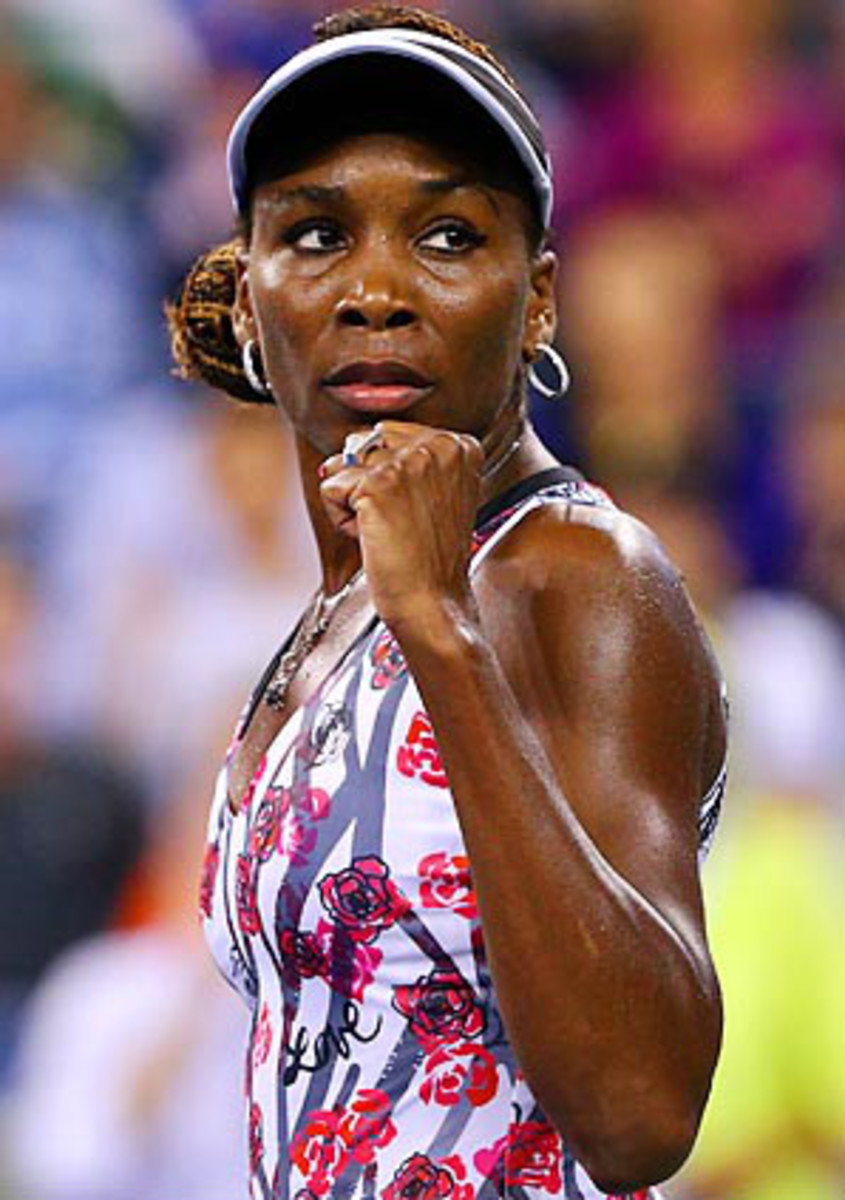
Venus finally feels U.S. Open love, but fans have long been behind her
The question comes again, in line at a Penn Station Starbucks. And again, in the messages that keep me company while I wait. And again, from Long Island Railroad commuters -- many of them disembarking with me at the Mets-Willets Point stop for the Billie Jean King National Tennis Center to see for themselves.
They won't find Venus Williams in the singles draw here anymore. She lost in the second round to Angelique Kerber of Germany 2-6, 7-5, 5-7 at Arthur Ashe Stadium on Thursday night. Her defeat wasn't the surprise. (Kerber is seeded sixth in the tournament; Williams was not seeded.) No, the surprise is that, until last night, Williams had no idea there was so much love for her in New York.
"Today I felt American, you know, for the first time at the U.S. Open," she said. "I've waited my whole career to have this moment."
This moment, one she went on to equate to winning a gold medal in London last month, came courtesy of a loyal late-night crowd that stopped at nothing to keep Williams' spirits up, not even at the resumption of play. Time and again, they committed tennis' ultimate breach of etiquette to rally her, crying "let's go Venus" during her points until she had none left to play. Support was similarly strong for her and Serena in their second-round doubles match against the 15th-seeded team of Poland's Klaudia Jans-Ignacik and France's Kristina Mladenovic; the unseeded sisters rode it to a 6-4, 6-0 victory.
Which only makes the idea of Venus as somehow less than American all the more stunning. Who's more apple pie than her? She has everything you could want in an American Idol: the bootstrapping backstory (Compton Girl Makes Good), the star-spangled career (seven grand slams, a No. 1 ranking). Her moxie alone paved the way for two seminal "bumps" -- one with Irina Spirlea in 1997, another in the earnings of women like her. She's in the U.S. Open's "It Must Be Love" ad campaign, for goodness sakes.
That said: Venus has a point. But whatever ambivalence she feels in the crowd is rooted in her complicated past here. No matter how worthy her cause, it seems there's always another to siphon support away. Her run to the semifinals in 1997 was a feel-good story, but her father, Richard, and the controversies he stirred up in the press scared fans off the bandwagon. In the 2000 final, she split encouragement with countrywoman Lindsay Davenport. In the next two finals, she shared the spotlight again with Serena.
The other times we sat on our hands? That's tougher to explain. Maybe it's because Venus' coolly efficient game never seemed like it needed much stoking. She has always been something of a cipher on the court, after all. Beyond the cries that ring out every time she crushes the ball, she doesn't let much out emotion. When she loses, it's never a matter of the juice coursing through the crowd or even the veins of her opponents. It's a matter of Venus dropping her guard.
But when Venus is in trouble? America has her back. When she battles through injury, her country cheers her on. When she presses on even further, through the even gloomier diagnosis of Sjögren's Syndrome, a chronic autoimmune condition that drains her strength, her country tells her she can beat it. When her older sister Yetunde was killed, tennis fans shared in her grief.
If Venus needs a lift, her country gives her one -- and it doesn't ask for any more trophies in return. Serena can handle that. And when Serena can't play, as was the case when she sat out the 2010 U.S. Open with foot injuries, she draws a little more of her sister out for us to love. Who could forget the live television post-match interview outside of Ashe when Serena ambushed Venus with the question, "So who are you seeing now?" The reply, while giggly, was typical Venus: "As I discussed in my press conference the other day, I have a commitment problem," she said in faux seriousness.
Maybe that's it. Maybe Venus' problem is that she gave up on her supporters too early. They certainly never gave up on her. Sure, they haven't always been on the same page with her, but credit them for sticking with the story, through all of its ups and the downs. And now? Seeing her persevere in a game that didn't want her at first is satisfaction enough. America will always have love for Venus. The shame is that it's taken so long to reach her.




